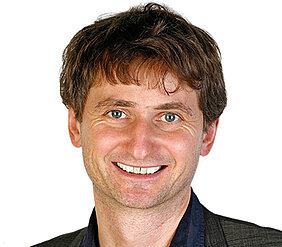Leibniz Prize awarded to RNA researcher
12/08/2016It is considered the German equivalent of the Nobel Prize: The Leibniz Prize awarded by the Deutsche Forschungsgemeinschaft (DFG) comes with a 2.5 million euros cash prize. The 2017 laureates now were announced: Jörg Vogel (49), an RNA researcher and infection biologist, is one of them.
The news caught him by surprise: Jörg Vogel was busy preparing an urgent grant proposal he wants to submit with Deutsche Forschungsgemeinschaft (DFG). Just at this moment, an e-mail from the DFG arrived in his inbox, informing him that he would receive one of the Gottfried Wilhelm Leibniz Prizes 2017 worth 2.5 million euros.
"I was flabbergasted," recalls the Würzburg professor for infection biology who was in Greifswald when he learned about the good news. On Thursday afternoon he held two lectures there: one at the university and the other at the Alfried Krupp Wissenschaftskolleg. So there where probably enough people present to congratulate him after the news of his top-notch recognition had made the rounds.
Since 2009, Professor Vogel has been the director of the Institute for Molecular Infection Biology (IMIB) of the Julius-Maximilians-Universität (JMU) Würzburg in Bavaria, Germany, and spokesman of the Research Center for Infectious Diseases (ZINF). Moreover, he is the founding director of the Helmholtz Institute for RNA-based Infection Research (HIRI) which the Helmholtz Association will establish at the JMU.
Vogel's research focuses on bacteria
The Leibniz laureate studies small regulatory RNA molecules of bacterial pathogens such as salmonella. He and his team are determined to get to the bottom of how these molecules work and act. His work could show new ways to fight pathogens.
"With Jörg Vogel, the award recognizes one of the world's leading researchers in the field of RNA biology," as a DFG press release puts it, stating further that he is given the prize for his seminal contribution to understanding regulatory RNA molecules in infection biology. According to the DFG, Vogel detected the importance of RNA biochemistry very early on. Moreover, he has done pioneering work in the field of RNA analysis with the application and development of high-throughput sequencing methods.
CV of Jörg Vogel
Jörg Vogel was born in Cottbus in 1967. He studied biochemistry at the Humboldt University in Berlin and at the Imperial College in London where he received his PhD in 1999. Following time in Sweden and Israel as a postdoc, he returned to Berlin in 2004 to lead a research group at the Max Planck Institute for Infection Biology. In 2009, he relocated to the University of Würzburg to become a Professor for Molecular Infection Biology.
Vogel has already received numerous awards for his research activities. Among others, he is an elected member of the European Molecular Biology Organization EMBO, the National Academy of Sciences (Leopoldina) and both the American and European Academy of Microbiology.
Facts about the Leibniz Prize
The Leibniz Prize will be handed to Vogel during a festive ceremony in Berlin on 15 March 2017. He can use the prize money for his research as he sees fit. In the 2017 awarding process, the DFG picked 10 scientists out of 134 proposed candidates. Vogel is one of two winners from Bavaria.
Since 1986, the DFG has awarded the Leibniz Prize to scientists who, at an early stage of their careers, have demonstrated superior achievements in their research areas and who show exceptional promise for future top-level accomplishments that will have a sustainable impact on the German research landscape.
The Würzburg winners of the Leibniz Prize
So far, eleven scientists from the University of Würzburg have won one of the coveted Leibniz Prizes: Otto Ludwig Lange and Ulrich Heber (ecology/biochemistry/1986), Hans-Peter Zenner (ear, nose and throat medicine and cell biology/1987), Ingrid Grummt and Bert Hölldobler (molecular biology/zoology/1990), Martin Lohse (pharmacology/1999), Ulrich Konrad (musical sciences/2001), Thomas Mussweiler (psychology/2006), Holger Braunschweig (chemistry/2009), Laurens Molenkamp (physics/2014) and Dag Nikolaus Hasse (Philosophy/2016).
Web links
Homepage of the Institute for Molecular Infection Biology IMIB







